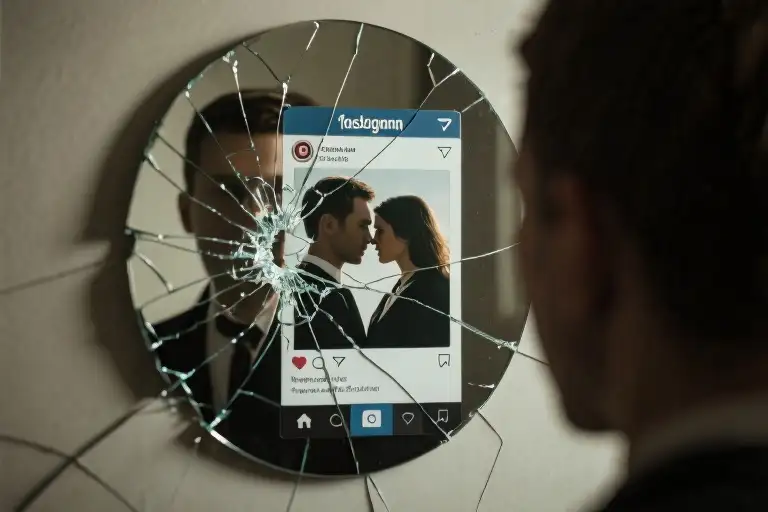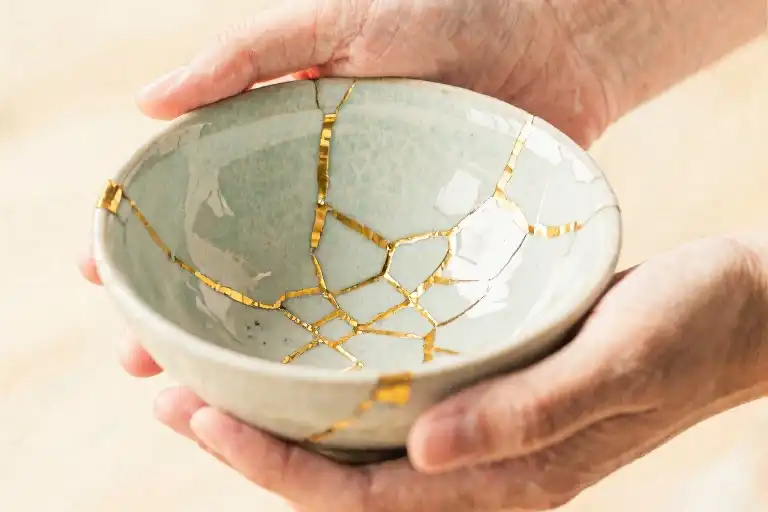You’ve been there, haven’t you? Scrolling through social media at 2 AM, accidentally stumbling upon your narcissistic ex’s glowing new relationship photos. That sinking feeling when you see them smiling arm-in-arm with their new partner at some tropical resort – looking happier than they ever did with you.
Here’s the hard truth you need to hear first: that picture-perfect happiness is just another performance. What you’re seeing isn’t real change – it’s simply Act Two of the same toxic play where you starred in Act One. The good news? You’ve already escaped the theater while their new partner just bought a ticket.
This phenomenon cuts deep because it triggers our most vulnerable questions: “Was I the problem? Am I not lovable enough? Why do they get this better version while I got the screaming, critical monster?” If you’re wrestling with these thoughts tonight, let me hold up a mirror to the narcissist’s game so you can finally see the truth behind their carefully staged happiness.
What you’re observing follows the same predictable narcissistic abuse cycle we all experienced, just with different actors. Remember those first magical months when your narcissist showered you with attention? When they memorized your coffee order and sent good morning texts without fail? That wasn’t genuine connection – that was love-bombing, the opening move in every narcissist’s playbook. Their new partner is currently basking in that same artificial sunshine, completely unaware of the emotional hurricane coming their way.
The cruel irony? Seeing them in this “honeymoon phase” often hurts more than the relationship itself. We start compiling mental lists: “He never took me to Bali” or “She’s wearing the necklace he refused to buy me.” But here’s what your heart needs to understand – those extravagant gestures aren’t signs of real love. They’re investments in maintaining the narcissist’s false self-image. The fancy vacations? Instagram fuel. The jewelry? A prop to impress friends. The love letters? Scripts copied from rom-coms.
Right now, you’re comparing your behind-the-scenes footage with their highlight reel. You know what happens when the cameras stop rolling – the tantrums over burnt toast, the silent treatments that last weeks, the way they’d tear you down after building you up. Their new partner will learn these truths too, just on a different timeline. Narcissists don’t change; they just change audiences.
When you see them being charming to new friends or fawning over family members, recognize this for what it is – strategic performance, not authentic connection. That cousin they suddenly adore? Probably got a promotion. That sibling they’re constantly praising? Might be useful for something. Narcissists collect people like accessories, discarding them when they’re no longer shiny.
The only reason Mr. Hyde hasn’t appeared yet is simple: the narcissist hasn’t gotten comfortable enough to take off the mask. But make no mistake – that mask always slips. Sometimes it’s when the new partner gets sick and needs care instead of giving admiration. Sometimes it’s when a family member stops providing narcissistic supply. The triggers vary, but the outbursts are inevitable.
Tonight, I want you to try something radical. Instead of torturing yourself with comparisons, picture this: one year from now, when the new partner posts a vague, sad quote about betrayal. Or when the “perfect” family member suddenly stops appearing in photos. Because that’s the dirty secret of narcissistic relationships – they all follow the same tragic script. You’re not seeing evidence that you weren’t enough; you’re seeing proof that you were strong enough to walk away from an unwinnable game.
Your freedom begins when you stop measuring your worth against their performances. Their ability to fake happiness says nothing about your ability to experience real joy. While they’re busy curating illusions, you get to build something genuine – and that truth will set you free.
The Illusion: Why Do They Seem ‘Better’ With Others?
You scroll through social media and there it is—your ex-partner or that difficult family member, glowing in a new relationship or surrounded by adoring relatives. They’re showering someone else with the affection you craved, laughing at inside jokes, posting gushing tributes. A voice whispers: They must be treating them so much better than they ever treated me.
Here’s the hard truth you need to hear first: That picture-perfect happiness is another performance. Narcissists don’t change—they simply rotate audiences. What you’re seeing now mirrors your own early days with them, before the mask slipped.
The Narcissist’s Playbook: Same Script, New Cast
Every new relationship follows their predictable three-act structure:
- The Overture (Love-Bombing Phase)
- Over-the-top compliments (“You’re my soulmate after two weeks!”)
- Grand gestures (surprise vacations, expensive gifts)
- Rapid intensity (quick “I love yous,” future-faking)
- The Intermission (Testing Boundaries)
- Occasional sarcastic “jokes” at your expense
- Guilt-tripping (“After all I’ve done for you…”)
- Withholding affection when you disagree
- The Final Act (Mr. Hyde Emerges)
- Full-blown rage over minor slights
- Gaslighting (“You’re too sensitive!”)
- Triangulation (flirting with others to punish you)
The key difference? Their new partner/family is still in Act 1. You’ve seen the entire show.
Your Brain vs. Their Illusion
When comparison strikes, remember:
- Recency Bias: Their new target hasn’t experienced the inevitable crash yet. Your 6-month nightmare outweighs their 6-week honeymoon.
- Survivor’s Paradox: You only see curated highlights—not the private meltdowns you endured.
- The Comfort Threshold: Narcissists reveal themselves only when they feel secure enough to do so. New relationships haven’t reached that breaking point.
“They treated me the same way in the beginning—flowers every day, handwritten notes. Then I mentioned disliking how they mocked my accent. Overnight, I became ‘the ungrateful bitch who ruined everything.'” — Sarah, 32
Material Love: When “Niceness” Has Strings Attached
Notice them fawning over wealthy relatives or well-connected new partners? That’s not affection—it’s investment. Narcissists calculate kindness like accountants:
- Social Currency: Associating with high-status people boosts their image
- Future Payoffs: Gifts to wealthy relatives often come with unspoken expectations
- Emergency Supply: They cultivate multiple sources of attention/resources
But no amount of money prevents the eventual explosion. Even their golden child/benefactor will eventually face wrath when the narcissist feels “disrespected.”
Breaking the Comparison Cycle
Next time you see their “perfect” new dynamic:
- Visualize the Timeline
Draw two parallel lines:
- Their current relationship: Mark where the love-bombing will fade (usually 3-6 months)
- Your past experience: Note when the devaluation began
The patterns will overlap eerily.
- Create a Reality Check List
Write down:
- 3 outrageous things they did to you that new people don’t know
- 2 compliments they gave you early on (identical to what they’re saying now)
- 1 moment you realized their kindness was conditional
- Redirect Your Focus
When the mental movies start, physically shift your body (splash cold water, snap a rubber band) and say aloud:
“I’m comparing my behind-the-scenes to their highlight reel. That’s not fair to me.”
Remember: Narcissists don’t upgrade—they recycle. You didn’t lose someone capable of real love; you escaped someone who only knows how to perform it.
The Mechanics: Honeymoon Phase, Masks, and the Inevitable Emergence of Mr. Hyde
That picture-perfect relationship your narcissistic ex seems to have? The way they dote on their new partner or suddenly become the golden child in another family member’s eyes? Here’s what’s really happening behind the scenes.
The Love-Bombing Playbook
Every narcissist follows the same three-act script when entering new relationships:
- The Charm Offensive (Weeks 1-3):
- Excessive compliments (‘You’re the most understanding person I’ve ever met’)
- Grand gestures (surprise gifts, elaborate dates)
- Rapid intimacy (‘I’ve never felt this connected to anyone’)
- The Testing Phase (Months 2-4):
- Occasional ‘slip-ups’ of irritability
- Backhanded compliments (‘You’d be perfect if…’)
- Gradual erosion of boundaries
- The Full Reveal (When Comfort Threshold is Crossed):
- First major outburst (often triggered by minor criticism)
- Withdrawal of affection as punishment
- Gaslighting about previous good behavior
Clinical studies show this cycle averages 3-6 months, though some skilled narcissists can maintain the facade longer in low-stakes relationships.
The Comfort Threshold Theory
Narcissists don’t change – they simply calibrate. Their mask stays firmly in place until they reach what therapists call the ‘comfort threshold’:
- Low Threshold Triggers:
- Financial dependence on the target
- Social status benefits
- Fear of exposure (e.g., workplace relationships)
- High Threshold Triggers:
- Emotional vulnerability from the narcissist
- Perceived loss of control
- Authentic intimacy demands
Remember: Their temporary good behavior isn’t about the other person’s worthiness. As one survivor perfectly phrased it, ‘A chameleon changes colors for survival, not for love.’
The Ugly Truth About Their ‘Kindness’
When you see a narcissist being unusually attentive to someone new, ask yourself:
- What’s the currency?
- Wealthy relative? Financial gain
- Popular coworker? Social capital
- New romantic partner? Ego supply
- What’s the timeline?
- Holiday seasons often see increased ‘generosity’
- Major life events (weddings, funerals) trigger performance mode
- Social media milestones invite public displays
Case in point: Sarah’s uncle suddenly started sending her designer gifts after she inherited her grandmother’s estate. The gifts stopped (along with his calls) when she established boundaries about loans.
Why This Matters For Your Healing
Understanding these patterns helps dismantle three toxic beliefs:
- ‘They changed for someone better’ → Truth: They’re repeating the same cycle
- ‘I wasn’t worthy of good treatment’ → Truth: No one gets lasting good treatment
- ‘Maybe if I waited longer…’ → Truth: Time doesn’t heal narcissism
Practical Exercise: Next time you see their ‘perfect’ new relationship, visualize a calendar marked with future dates labeled:
- First major fight
- First silent treatment
- First gaslighting incident
This isn’t cynicism – it’s recognizing predictable patterns. As the saying goes, ‘When someone shows you who they are, believe them the first time.’ Everyone eventually sees Mr. Hyde; you just had the strength to walk away sooner.
Healing: 3 Mental Exercises to Stop Comparing Yourself
That sinking feeling when you scroll through social media and see your narcissistic ex or family member glowing in their new relationship? That gut-punch thought: “They must be treating them so much better”? Let’s dismantle that illusion together—because freedom begins when you stop measuring your worth against their performance.
1. Cognitive Reframing: “Their Behavior Is a Script, Not Your Failure”
When you catch yourself thinking “Why am I not good enough for them to act this way?”, pause. Visualize this:
- The narcissist as an actor: Their charm offensive with new people isn’t about the recipient—it’s about securing attention/supply. Like a Broadway understudy performing the same role for different audiences.
- Your past experience as proof: Remember how they initially treated you? The love-bombing, the grand gestures? This is simply Act 1 repeating with a new cast member.
Exercise: Next time comparison strikes, say aloud: “This isn’t about me. They’re following a playbook.” (Pro tip: Scream it in the shower if needed.)
2. Future Forecasting: “Picture Their New Partner’s ‘After’ Photos”
That Instagram-perfect couple pic? Here’s what the algorithm won’t show you:
- The timeline: Studies show narcissists’ “idealization phase” lasts 3-12 months before devaluation begins. Imagine:
- Month 1: Romantic getaways, #blessed captions
- Month 6: Passive-aggressive comments on posts
- Month 12: Deleted couple photos, vague sad-song lyrics
- Your advantage: You’ve already survived their worst—while their new target is still naively in Act 1.
Exercise: Literally sketch this timeline on paper. Post it where you’ll see it during weak moments.
3. Boundary Blueprint: “3 Things I’ll Never Tolerate Again”
Comparison often stems from unresolved hurt. Reclaim power by defining what you deserve:
- The dealbreaker (e.g., “I won’t accept being mocked in front of others”)
- The non-negotiable (e.g., “I require apologies for hurtful actions”)
- The self-respect guardrail (e.g., “I’ll walk away when voices raise beyond X volume”)
Exercise: Write these on sticky notes—one for your mirror, one for your wallet. When tempted to compare, pull it out and ask: “Did they meet ANY of these standards?”
Remember: Narcissists don’t change—they just change audiences. Your healing isn’t about them treating someone else “better.” It’s about you realizing: You were never the problem. Now take that truth and build relationships where you’re not just another character in their endless drama.
Closing Thoughts: Reclaiming Your Narrative
Standing at the end of this journey, you now hold something powerful: clarity. That gut-wrenching confusion when you saw them glowing in new relationships? The sleepless nights wondering if you were the problem? Those were chapters in your story, not the ending.
Your Daily Reminder
Keep this phrase where you’ll see it daily—on your mirror, phone lock screen, or coffee mug: “I deserve relationships that don’t require detective work.” When old doubts creep in (and they will), say it aloud. Neuroscience shows verbal affirmations rewire thought patterns—you’re literally upgrading your emotional operating system.
The Truth About Their “New Audience”
Remember: narcissists don’t upgrade; they recycle. That charming persona you see them using with others? You’ve backstage passes to the whole production. While new players are still marveling at the special effects, you know where the trapdoors are hidden. This isn’t loss—it’s liberation.
Your Standing Ovation
Here’s what they’ll never have: the courage you’ve shown by facing hard truths. While they chase standing ovations from strangers, you’re learning the quiet art of self-applause. That slow clap building inside you? That’s authentic confidence—the kind no mask can replicate.
Moving Forward
- Curate your feed: Mute/unfollow anything triggering comparison
- Create closure rituals: Write a letter (then safely burn it)
- Spot authentic connections: Note how healthy relationships feel effortless
You’re not just surviving narcissistic abuse; you’re collecting missing pieces of yourself they tried to scatter. Every reclaimed fragment makes their performance seem smaller—until one day, you’ll realize you forgot to check the reviews.
“The opposite of narcissism isn’t selflessness—it’s wholeness.”





